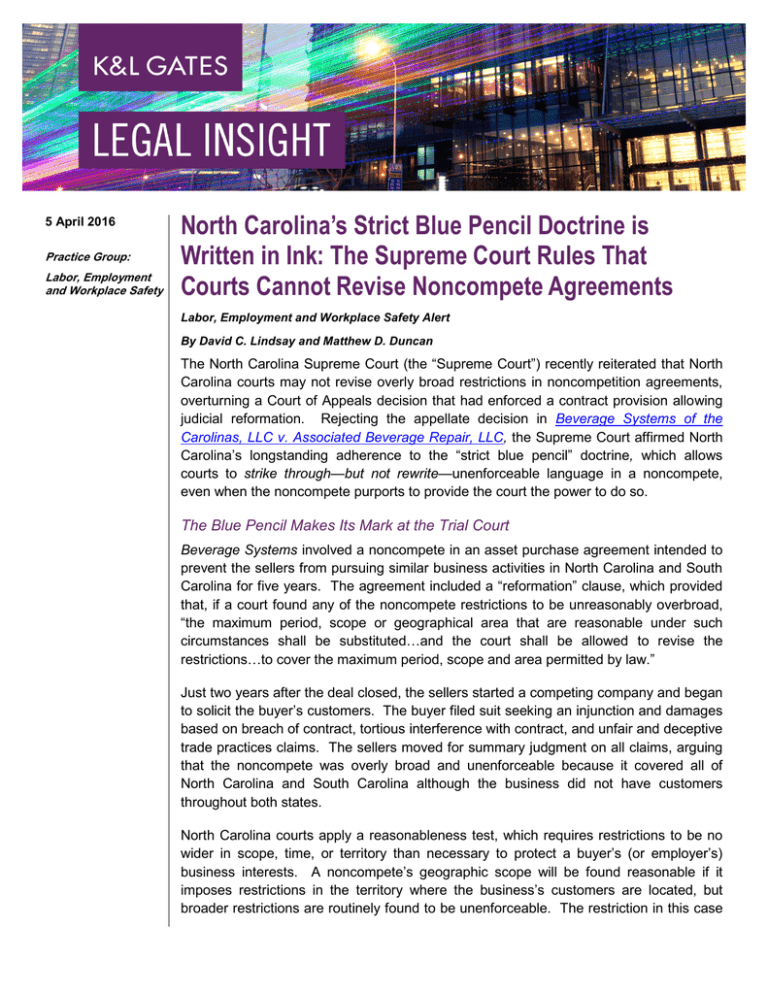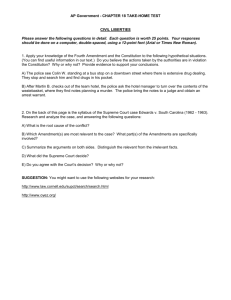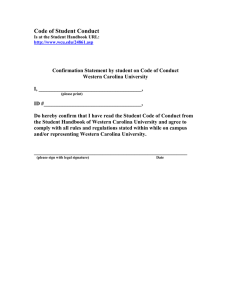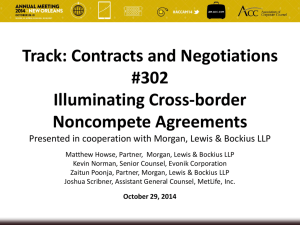
5 April 2016
Practice Group:
Labor, Employment
and Workplace Safety
North Carolina’s Strict Blue Pencil Doctrine is
Written in Ink: The Supreme Court Rules That
Courts Cannot Revise Noncompete Agreements
Labor, Employment and Workplace Safety Alert
By David C. Lindsay and Matthew D. Duncan
The North Carolina Supreme Court (the “Supreme Court”) recently reiterated that North
Carolina courts may not revise overly broad restrictions in noncompetition agreements,
overturning a Court of Appeals decision that had enforced a contract provision allowing
judicial reformation. Rejecting the appellate decision in Beverage Systems of the
Carolinas, LLC v. Associated Beverage Repair, LLC, the Supreme Court affirmed North
Carolina’s longstanding adherence to the “strict blue pencil” doctrine, which allows
courts to strike through—but not rewrite—unenforceable language in a noncompete,
even when the noncompete purports to provide the court the power to do so.
The Blue Pencil Makes Its Mark at the Trial Court
Beverage Systems involved a noncompete in an asset purchase agreement intended to
prevent the sellers from pursuing similar business activities in North Carolina and South
Carolina for five years. The agreement included a “reformation” clause, which provided
that, if a court found any of the noncompete restrictions to be unreasonably overbroad,
“the maximum period, scope or geographical area that are reasonable under such
circumstances shall be substituted…and the court shall be allowed to revise the
restrictions…to cover the maximum period, scope and area permitted by law.”
Just two years after the deal closed, the sellers started a competing company and began
to solicit the buyer’s customers. The buyer filed suit seeking an injunction and damages
based on breach of contract, tortious interference with contract, and unfair and deceptive
trade practices claims. The sellers moved for summary judgment on all claims, arguing
that the noncompete was overly broad and unenforceable because it covered all of
North Carolina and South Carolina although the business did not have customers
throughout both states.
North Carolina courts apply a reasonableness test, which requires restrictions to be no
wider in scope, time, or territory than necessary to protect a buyer’s (or employer’s)
business interests. A noncompete’s geographic scope will be found reasonable if it
imposes restrictions in the territory where the business’s customers are located, but
broader restrictions are routinely found to be unenforceable. The restriction in this case
North Carolina’s Strict Blue Pencil Doctrine is Written in Ink: The Supreme
Court Rules That Courts Cannot Revise Noncompete Agreements
was found to be too broad. As a result, the noncompete was unenforceable as written,
and the trial court had to determine whether it could be saved in light of North Carolina’s
adoption of the blue pencil doctrine.
Under the blue pencil doctrine, courts may only strike offending and distinctly separable
provisions and enforce reasonable provisions that remain; they are powerless to rewrite
overreaching noncompetes. For example, courts may not replace an overbroad
geographic territory with a reasonable subdivision of that territory. The trial court could
save the Beverage Systems noncompete only if the parties themselves drafted
reasonable provisions that could stand independently after the court struck any
unreasonable provisions.
In this instance, the noncompete contained only one territorial restriction. If the court
struck that restriction, the noncompete would be unenforceable because no
geographical limitations would remain. Adhering to the blue pencil doctrine, the trial
court declined to exercise the authority granted by the reformation clause, refused to
redraft the noncompete, and granted the seller’s motion for summary judgment in its
entirety. The buyer appealed.
The Court of Appeals Reverses: Partially Erasing the Blue Pencil Doctrine
A divided panel of the North Carolina Court of Appeals reversed the trial court’s order.
Although the majority agreed that the noncompete was overly broad, it determined that
the trial court should have exercised the authority granted in the reformation clause to
reshape the restricted territory as necessary to protect the buyer’s business interests.
The majority held that the blue pencil doctrine’s limitations were inapplicable because
the parties, “at arms-length with equal bargaining power,” expressly agreed to give the
trial court the authority to rewrite the noncompete. The majority reasoned that
exceeding the restrictions of the blue pencil doctrine, specifically in a sale-of-business
context, would allow trial courts greater flexibility in adjudicating noncompete disputes,
made “good business sense and better protect[ed] both a seller’s and purchaser’s
interests in the sale of a business.” The Court of Appeals remanded the case to the trial
court to revise the noncompete’s offending geographic restriction and revived the
buyer’s claims. However, because the decision was not unanimous, the seller had a
right to appeal the appellate court’s break from established precedent to the Supreme
Court.
The North Carolina Supreme Court Traces the Blue Pencil in Ink
Rejecting the Court of Appeals’ attempt to gain greater flexibility in adjudicating
noncompete disputes, the Supreme Court reversed. In an opinion authored by Justice
Edmunds, the Supreme Court agreed that blue-penciling would not save the
noncompete because if the unreasonable portion was stricken, the noncompete was no
2
North Carolina’s Strict Blue Pencil Doctrine is Written in Ink: The Supreme
Court Rules That Courts Cannot Revise Noncompete Agreements
longer enforceable. But, the Supreme Court swiftly rejected the noncompete’s
reformation clause, holding that “the parties cannot contract to give a court power that it
does not have.” The Supreme Court explained its rationale for refusing to redraft the
parties’ agreement:
Allowing litigants to assign to the court their drafting duties as parties to a
contract would put the court in the role of scrivener, making judges
postulate new terms that the court hopes the parties would have agreed
to be reasonable at the time the covenant was executed or would find
reasonable after the court rewrote the limitation. We see nothing but
mischief in allowing such a procedure.
Having invalidated the noncompete, the Supreme Court held that the trial court correctly
allowed the seller’s motion for summary judgment as to all claims.
How to Draft Noncompetes for the Blue Pencil
Beverage Systems eliminates all doubt that reformation clauses cannot circumvent the
blue pencil rule: they are unenforceable in North Carolina. Because courts are limited to
striking—as opposed to revising—offending provisions, savvy practitioners often draft
noncompetes governed by North Carolina law with discrete, grammatically severable,
“step-down” components that provide for alternative restraints of staggered scope. Each
component covers an increasingly lesser increment of time or territory to allow a trial
court to strike what it deems unreasonable but ensure the survival of at least some
minimum restraint on competition by the employee. Had the Beverage Systems
noncompete contained such discrete components, the trial court could have used the
blue pencil rule to select the geographic restriction it believed was reasonable. Without
them, there was no way to save the noncompete.
Authors:
David C. Lindsay
david.lindsay@klgates.com
+1 919 743 7304
Matthew D. Duncan
matthew.d.duncan@klgates.com
+1 919 743 7329
3
North Carolina’s Strict Blue Pencil Doctrine is Written in Ink: The Supreme
Court Rules That Courts Cannot Revise Noncompete Agreements
Anchorage
Austin
Fort Worth
Frankfurt
Orange County
Beijing
Berlin
Harrisburg
Palo Alto
Paris
Boston
Hong Kong
Perth
Brisbane
Houston
Pittsburgh
Brussels
London
Portland
Charleston
Los Angeles
Raleigh
Charlotte
Melbourne
Research Triangle Park
Chicago
Miami
Dallas
Milan
San Francisco
Doha
Newark
São Paulo
Dubai
New York
Seattle
Seoul Shanghai Singapore Sydney Taipei Tokyo Warsaw Washington, D.C. Wilmington
K&L Gates comprises approximately 2,000 lawyers globally who practice in fully integrated offices located on five
continents. The firm represents leading multinational corporations, growth and middle-market companies, capital
markets participants and entrepreneurs in every major industry group as well as public sector entities, educational
institutions, philanthropic organizations and individuals. For more information about K&L Gates or its locations,
practices and registrations, visit www.klgates.com.
This publication is for informational purposes and does not contain or convey legal advice. The information herein should not be used or relied upon in
regard to any particular facts or circumstances without first consulting a lawyer.
© 2016 K&L Gates LLP. All Rights Reserved.
4






